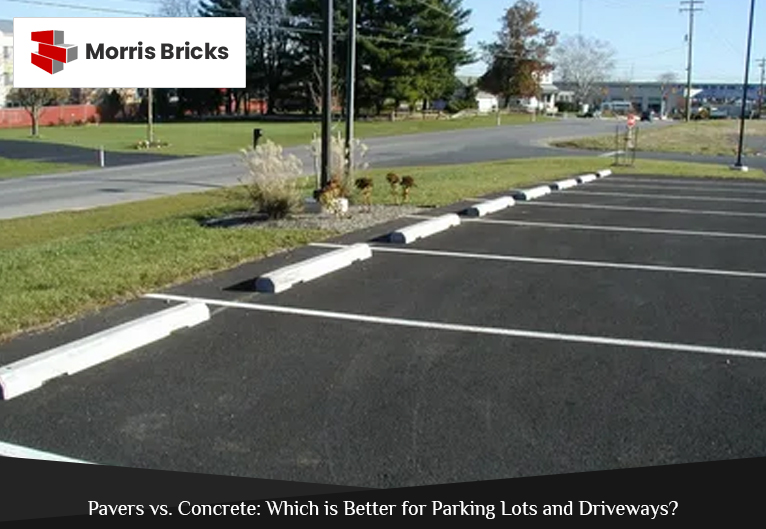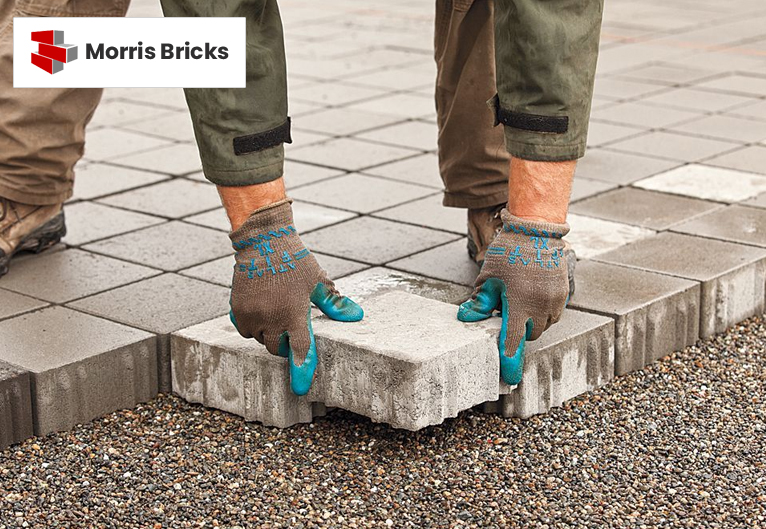Pavers vs. Concrete: Which is Better for Parking Lots and Driveways?
When planning the driveway of a home or parking lot, there are many options to choose from. Two of the major choices are pavers and concrete. Both building materials are popular due to their strength, durability, and beauty. However, each has its own specific uses and distinct advantages. Choosing the right material for a driveway or parking lot is essential as it not only enhances the beauty of your property but also ensures long-term durability.
When you select the material for your driveway, you need to take into account several aspects, such as durability, maintenance, drainage, and beauty. In addition, it is also important that you consider the design features that suit your location. Both pavers and concrete are durable, but their installation and long-term maintenance requirements may differ.
Pavers are small stones or blocks that vary in design and aesthetics. Concrete, on the other hand, has a solid and strong surface, which proves useful in areas with heavy traffic. Choosing between pavers and concrete depends on the type of texture and use you need in your space.
Pavers: Flexibility and Beauty
Pavers are available in a variety of shapes, colors, and designs, making them a very flexible and beautiful option. Because of their variety and design, pavers are preferred by people who want to make their driveway look attractive.
Durable and Flexible
The biggest feature of pavers is their flexibility. They are designed in such a way that these small blocks come together to form a flexible structure that can withstand heavy pressure and slight fluctuations of the surface. Because of this flexibility, pavers are very durable. If there is any movement in the surface, the pavers adjust themselves accordingly, preventing cracks.
The biggest advantage of pavers is that they are able to withstand pressure. The small gaps between them also prevent drainage problems, which prevents waterlogging during rainy days.
Variety of designs
The beauty of pavers lies in the fact that you can find them in a variety of colors and patterns. Whether you want a classic brick look or a modern, sleek design, the variety of pavers caters to your every design requirement. Using pavers not only makes your driveway look beautiful but also enhances the overall appeal of your home’s exterior.
Another advantage of pavers is that you can arrange them in any pattern. Whether it is a simple laying or an intricate mosaic design, the variety of pavers gives you a lot of options.
Easy maintenance
Pavers are very easy to maintain. If any part of them breaks, you don’t have to rebuild the entire driveway. You can simply replace that particular block. This feature makes pavers an excellent choice, especially for those who want a maintenance-free surface for a long time.
This also means that you don’t have to worry about re-installing the pavers or doing any major repairs from time to time. You can easily replace any damaged parts and get the driveway back to like-new condition.
Eco-friendly
Pavers are eco-friendly because they have small gaps between them that allow rainwater to be absorbed directly into the ground. This reduces water wastage and also gets rid of waterlogging problems. This is also one of the reasons why pavers are often used in places where there are drainage problems. Also, pavers are suitable for recycling, making them an eco-friendly option.
Concrete: Strength and Stability
Concrete has been used for centuries because of its durability and strength. It forms a single, solid surface that provides a strong base for the driveway.
Extreme Durability
Concrete is an option that is extremely durable and long-lasting. Its solid surface can withstand the pressure of heavy vehicles. Concrete is especially used in places with heavy traffic, as it is able to withstand extreme weight and use. In addition, the surface of concrete is so hard that it requires very little general maintenance. Once it is installed, it works without any problems for decades.
Easy Construction
The construction process of concrete is simple. It is spread on the surface, leveled and after drying, it turns into a solid structure. Due to its simplicity, it can be laid quickly even on large surfaces. In addition, the smooth surface of a concrete driveway makes it easy to clean and maintain. Once it is well installed, it does not require any maintenance for a long time.
Long-term durability
Another advantage of concrete is that it does not require major maintenance from time to time. Once installed, it lasts for decades without any problems. However, concrete is prone to cracking in extreme temperatures, but this can be fixed with the right care.
Effects of temperature
One problem with concrete is that it can crack due to extreme heat or cold. However, this problem can be minimized by using special types of concrete in cold and hot regions.
Pavers vs Concrete: Key Differences
So far, we have discussed the features of pavers and concrete, now let’s know the main differences between the two. These differences will help you decide which one to choose.
Flexibility and strength
Pavers are flexible and are joined in small parts, allowing them to adjust easily when there is movement in the surface. Concrete, on the other hand, forms a hard and solid surface, but can crack due to changes in temperature and pressure.
Design and Aesthetics
Pavers are more aesthetic due to their variety of designs and colors. Concrete, on the other hand, forms a plain-looking surface, although it can be decorated through stamping or dyeing.
Maintenance
Pavers are relatively easy to maintain, as you can easily replace any damaged parts. Concrete can be difficult to repair, especially when cracks develop. Concrete repairs take time and effort, as the entire surface may need to be repaired all at once.
Drainage
Another big advantage of pavers is that the small gaps between them allow rainwater to seep into the ground below. This reduces waterlogging problems and provides an environmentally friendly solution. Concrete surfaces, on the other hand, are completely solid, which does not allow water to seep down easily and requires special drains or slopes for drainage.
How to make the right choice?
Now that we have understood the features, advantages, and differences between pavers and concrete, the question arises as to how to choose the right option. This decision depends entirely on your personal needs, preferences, and the specifications of the driveway or parking lot.
Durability requirement
If you want the most durable and strong option for your driveway that can withstand the pressure of even heavy vehicles, concrete can be a good choice. It is tough, durable, and long-lasting. However, if you need flexibility and ease of driveway maintenance, pavers can prove to be a better option, especially if you want your driveway to be able to adjust over time and can be easily repaired.
Aesthetic preference
If design and aesthetics are more important to you, pavers can be your preferred choice. Due to the variety of colors and patterns, you can use pavers that match the exterior of your home. They not only make your driveway attractive but also enhance the appeal of your entire home. Concrete can also be decorated with a variety of dies and stampings, but its aesthetic possibilities are fewer than those of pavers.
Environmental Awareness
If you are environmentally conscious and want to tackle drainage issues, pavers are a great choice. The gaps between them allow water to seep into the ground easily, preventing waterlogging. In contrast, water can stagnate on a solid concrete surface, requiring extra effort for drainage.
Regional and weather requirements
The climate of the region you live in can also play an important role in your material choice. If you live in cold or extremely hot regions, concrete is more likely to crack. Pavers, on the other hand, can easily withstand temperature fluctuations as they are flexible and can adjust automatically.
Both pavers and concrete are good options for parking lots and driveways. Depending on your needs and preferences, you can choose any of these options. While concrete is known for its strength and durability, pavers are popular for their design variety and flexibility. When deciding which option is best for your home or parking lot, you should consider not only durability and aesthetics, but also drainage, maintenance, and environmental considerations. Choosing the right material will not only make your driveway durable, but also enhance the beauty and functionality of your home.

